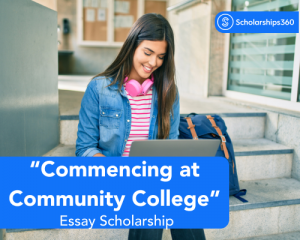

By Maria Geiger

Maria Geiger is Director of Content at Scholarships360. She is a former online educational technology instructor and adjunct writing instructor. In addition to education reform, Maria’s interests include viewpoint diversity, blended/flipped learning, digital communication, and integrating media/web tools into the curriculum to better facilitate student engagement. Maria earned both a B.A. and an M.A. in English Literature from Monmouth University, an M. Ed. in Education from Monmouth University, and a Virtual Online Teaching Certificate (VOLT) from the University of Pennsylvania.
Reviewed by Bill Jack
Bill Jack has over a decade of experience in college admissions and financial aid. Since 2008, he has worked at Colby College, Wesleyan University, University of Maine at Farmington, and Bates College.
Updated: July 15th, 2024
Scholarship essays are an inevitable part of most scholarship applications. Sadly, many qualified students see an essay requirement, think, “I’m not a good writer,” and decide not to apply. Don’t fall into that trap! Learn how to write a winning scholarship essay today!
As a former writing instructor, I know firsthand that anyone can write a winning scholarship essay if they devote the time and effort. Follow the steps below to write an excellent scholarship essay and dramatically increase your chances of winning scholarships!
For most people, it’s not possible to write a stellar essay ten minutes before the application deadline. We recommend giving yourself a few hours to write the first draft of your scholarship essay. Ask a friend to read it over or just take some time away, then take another hour to proofread your essay, ideally the next day.
Apply to these scholarships due soon










Remember, the reader is not in your head. A solid essay structure is needed to convey your ideas effectively. Before you begin writing:
Create an outline to map out your idea
Plan for multiple paragraphs, with each paragraph headed by a clear topic sentence for that paragraph’s main point
Use a transitional sentence or phrase at the end of each paragraph to connect one idea to the next
Nothing will set you back like not responding to the prompt provided. It screams “this person didn’t bother to fully read the directions,” or worse, “this person doesn’t care about what we are asking.”
Read the prompt, and then read it again. This is where giving yourself plenty of time to write comes in handy. Rather than immediately starting to write:
Your writing teachers were not joking about the importance of the introductory hook. There are a number of ways to hook the reader, including:
For an example of an engaging hook, say you are writing an essay about social media distraction. Perhaps you could open with:
It might sound odd, but I love my flip phone. In fact, I feel nothing but disdain for that moment stealing villain, the iPhone .
See how you’re already interested in reading on? Effective writing is all about telling an engaging story, and a strong hook is the first step!
Be mindful of any required formatting. This might include a word count or page limit. The application may also specify single or double sentence spacing, using certain fonts, or using a certain format, such as MLA or APA.
Finally, no matter what, do your best to tell an engaging story! If given the opportunity, focus on a specific challenge you’ve faced or goal you’ve achieved. As you tell your story, the qualities that make you a great scholarship applicant–your drive, your passion, and your personality–will shine through!
Speaking of conclusions, don’t end your scholarship application essay with “in conclusion,” which sounds robotic on the page. Instead, think about why what you wrote matters, and remind the reader of just that.
An effective way to bring cohesion to your essay is to refer back to your hook in the closing. For example, if you used that flip phone introduction, your closing might say:
So while some people have 100s of pictures of “experiences” that they were not truly present for, I have lifelong memories stored in my own mind, no extra cloud space required.
Notice how that ending wows? It wraps up your “story” and leaves the reader with a lasting impression of who you are as a person.
For more in-depth instructions on how to conclude your scholarship essay, you can consult our guide on how to end scholarship essays . If you are looking for additional scholarship opportunities, check out our list of top writing & essay scholarships .
Remember, writing scholarship essays is an opportunity to show who you are in a way that test scores and rankings never can. Don’t miss out on winning scholarship awards that you qualify for. Happy writing, all, and don’t forget to apply for all the scholarships you qualify for!